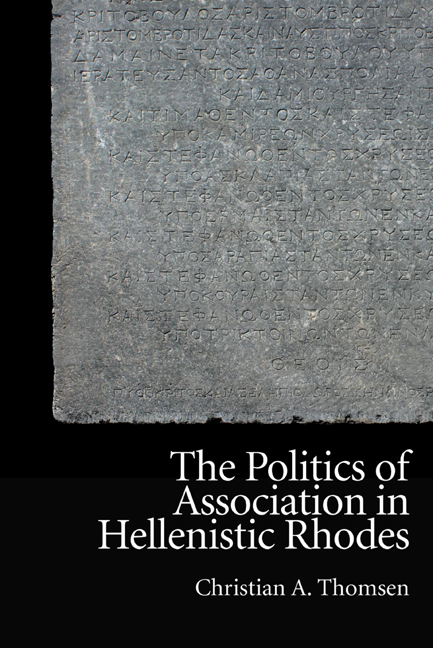Book contents
- Frontmatter
- Contents
- List of Tables and Figures
- Acknowledgements
- Abbreviations of Epigraphic Corpora
- Maps
- 1 Introduction
- 2 Rhodian Democracy
- 3 The Oikos
- 4 Public Associations
- 5 Private Associations
- 6 Private Associations and Human Resources
- 7 The Civic Aspirations of Private Associations
- 8 The Corporate Polis
- Bibliography
- Index Locorum
- General Index
4 - Public Associations
Published online by Cambridge University Press: 08 October 2020
- Frontmatter
- Contents
- List of Tables and Figures
- Acknowledgements
- Abbreviations of Epigraphic Corpora
- Maps
- 1 Introduction
- 2 Rhodian Democracy
- 3 The Oikos
- 4 Public Associations
- 5 Private Associations
- 6 Private Associations and Human Resources
- 7 The Civic Aspirations of Private Associations
- 8 The Corporate Polis
- Bibliography
- Index Locorum
- General Index
Summary
The deme was the fundamental unit of citizen organisation in Hellenistic Rhodes and all citizens belonged to one. Membership was hereditary and upon coming of age citizen men and women were entered onto the rolls of their father's deme. From thereon out, deme membership was an integral part of citizen identity and expressed through the regular addition of a demotikon to a citizen's name. Hundreds of inscribed epitaphs, particularly from the necropolis outside the Rhodian asty, are evidence of the importance placed on membership even in non-political contexts.
Each of the fifty-five demes (which are securely attested as such) was closely associated with a part of Rhodian territory either on the island itself, or on the mainland (the Peraia) or the constituent islands: the Thyssanountioi in Thyssanous on the Loryma peninsula, the Nettidai in Netteia, modern-day Apolakkia, on the south-western coast of Rhodes, and the Brasioi further north in Brasia, ‘the most beautiful land’ in the foothills of Mount Atabyros, to mention only a few of those whose geographic location is known with some precision.
The demes held assemblies and elected a number of magistrates, and seem to have been responsible for the maintenance of sanctuaries and other matters of cult. A mid-second-century decree of the demesmen of the Tymnioi on the mainland allows a glimpse into the smaller world of deme society. Their decree orders that a stoa in or near the deme's agora be made available to those who sacrifice to Zeus and Hera, along with certain furnishings to prepare the stoa for the event, but calls upon a magistrate, the hierothytas, the public slave (damosios) and any one of the demesmen to denounce any disorderly behaviour (specifically the burning of wood in the stoa and otherwise damaging the building) before another magistrate, the hierotamias. The latter, in the case of transgressions, would exact a fine to be paid to Apollo. Other deme decrees confirm that many if not all demes were custodians of important sanctuaries, such as the sanctuary of Athana in Arkaseia, Asklapios in Thyssanous, and Apollon Kedreieos in Kedrea.
- Type
- Chapter
- Information
- The Politics of Association in Hellenistic Rhodes , pp. 65 - 88Publisher: Edinburgh University PressPrint publication year: 2020



